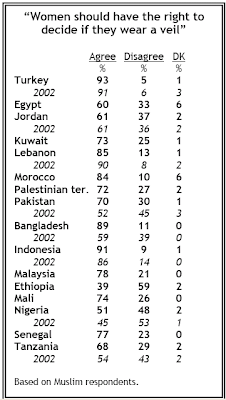Pakistan seems to be really bad for women in terms of economic participation and opportunity (a measure which includes labor force participation, wage equality for similar work, income, legislators, senior officials and managers, and professional and technical workers), educational attainment (literacy rate, and enrollment in primary, secondary and tertiary education), and health and survival (sex ratio at birth and healthy life expectancy).
This is grim indeed. The question that comes to my mind though is why does Pakistan fare so poorly? The data shows that there are numerous Islamic countries far ahead of Pakistan, and there are countries poorer than Pakistan which also are better. So easy answers like "It's because of religion" or "it's because of economics" don't really apply.
Out of curiosity I checked to see how Pakistan ranks in per-capita GDP compared to some of the other countries on the list. Fareed Zakaria argues in his book, The Future of Freedom, that liberal rights should be correlated with this measure (among other things - the book is highly recommended). Wikipedia has a list of countries ranked by per-capita GDP (normalized for "purchasing power" to even out currencies) using data from the International Monetary Fund, and we see that Pakistan is pretty low on the list:
| Rank | Country | per-capita GDP |
|---|---|---|
| 4 | United States | $43,223 |
| 70 | Turkey | $9,240 |
| 110 | Egypt | $4,895 |
| 118 | India | $3,802 |
| 132 | Pakistan | $2,744 |
| 144 | Bangladesh | $2,130 |
| 163 | Afghanistan | $1348 |
| 170 | Yemen | $984 |
Note that Yemen and Afghanistan do rank below Pakistan here, but they were not included in the Pew survey. Almost all of Africa ranks below Pakistan, but the African countries surveyed still fare better on the Pew questions (particularly the marriage choice issue). I haven't made the effort to see where the African countries fall on the Gender Gap Report, as that is as much a function of poverty and war and hence my assumption is that the African countries will fare worse overall.
So what is going on here? Though I have no doubt it will be spun otherwise by the jafisphere, Islam is clearly not the causative factor. Additional evidence is in the surprising result from Pew on the question of whether a woman has the right to decide whether to wear the veil or not (see chart below - click to enlarge). Pakistan is fairly moderate and has become even more so in the past five years, whereas countries in the middle east have actually regressed. So the attitudes towards women are at least partially separable from attitudes about religion.

The answer probably lies in tribal attitudes. As far as I am aware, Afghanistan and Pakistan have stronger tribal identities than in most of the rest of the world, and given how much of these states are still frontier, the ability of the government to ameliorate and dilute tribal allegiances and values is close to nonexistent. Much of the region exists in a pre-Westphalian condition, which is also why it remains a natural haven for Al Qaeda. In that sense, the situation for women is probably going to remain unchanged until the attending situations of stability, law and order, and liberal rights and freedom are addressed first.
The other day I was telling a friend of mine from Pakistan about a documentary I saw about a women's prison in Iran - most of the women (and a few little girls) were there for trying escape their husbands. I took this as proof that Iran keeps women as slaves, if trying to escape is a crime.
ReplyDeleteMy friend told me that in Pakistan, if a women was foolish enough to go to the police and tell them that her husband was abusing her or trying to kill her, the police would laugh at her and force her back to her husband.
I'm not entirely sure which country is worse.
But to deny that this attitude doesn't come from Islam, is dishonest. An Arabic speaking bloggers recently posted a list of suras from the Koran that are usually mistranslated into English - and he claims that there the one on beating women is one such - there is nothing in the arabic about beating "lightly".
NS, I guess you are predisposed to believe a sole blogger opining about a verse of the qur'an in that way, but I assure you his opinion is not representative of the 1400 years of Qur'anic exegesis on the topic.
ReplyDeleteI agree that attitudes towards women may be influenced by perceptions of Islam, but in those cases it is Islam being interpreted in the context of tribal attitudes (and thus lendingt those tribal attitudes legitimacy). Just like when I swing a hammer, whther I am swinging it at a nail or at someone's head is a function of whether I am a carpenter or a psycho. The hammer is just the hammer. Blaming it is irrelevant.